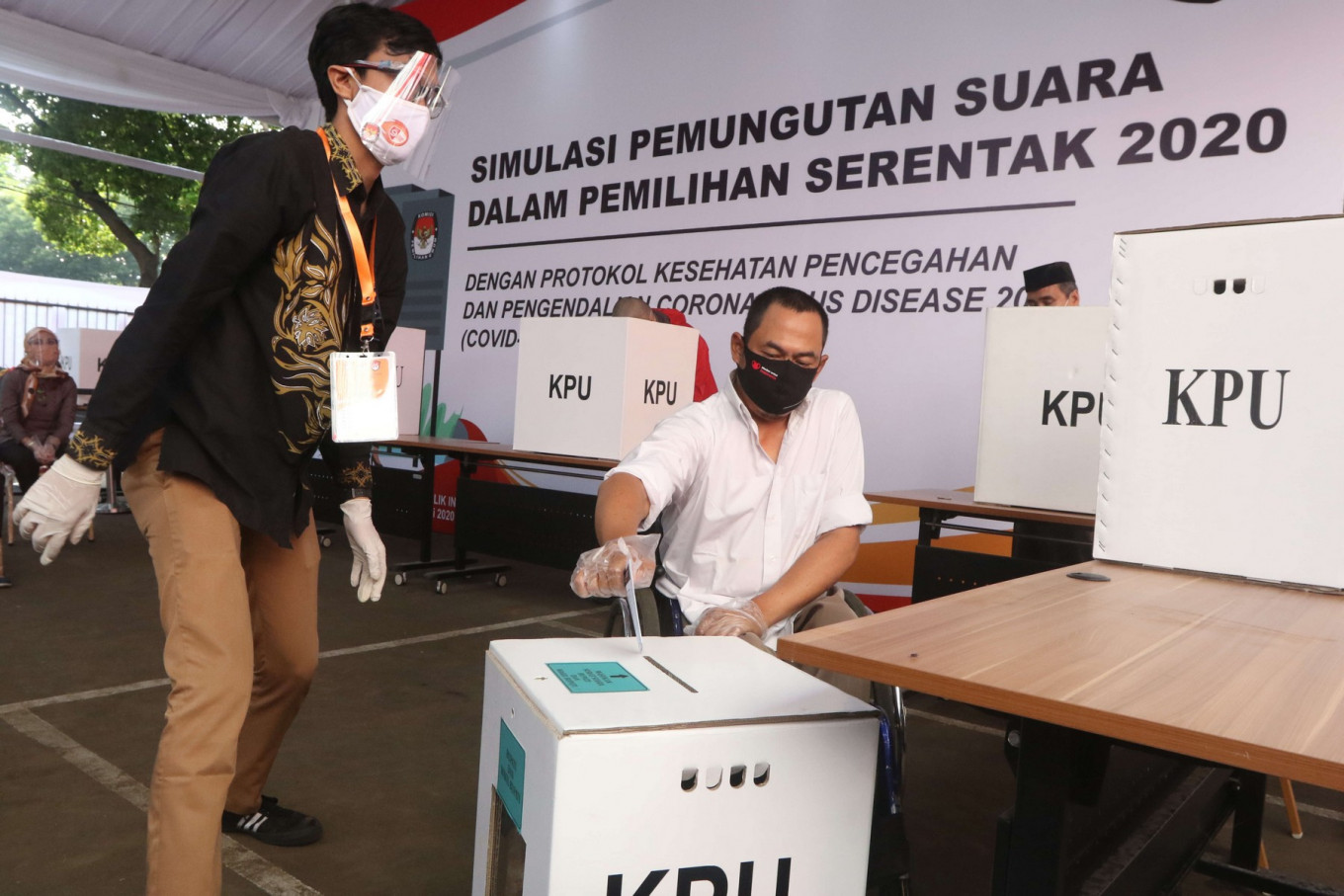Popular Reads
Top Results
Can't find what you're looking for?
View all search resultsPopular Reads
Top Results
Can't find what you're looking for?
View all search resultsUncontested races
From only three sole candidate pairs in the 2015 regional elections, the number rose to nine in 2017, 16 in 2018 and now, at least provisionally, 28.
Change text size
Gift Premium Articles
to Anyone
 An election official helps a voter with a disability take part in a simulation of the 2020 simultaneous regional elections in the front yard of the General Elections Commission (KPU) headquarters on July 22. The KPU implemented COVID-19 protocols while holding the voting simulation. JP/Dhoni Setiawan
(JP/Dhoni Setiawan)
An election official helps a voter with a disability take part in a simulation of the 2020 simultaneous regional elections in the front yard of the General Elections Commission (KPU) headquarters on July 22. The KPU implemented COVID-19 protocols while holding the voting simulation. JP/Dhoni Setiawan
(JP/Dhoni Setiawan)
O
f the 210 provinces, regencies or cities that will elect regional leaders for the next five years in December, no fewer than 28 regions will see only one ticket contesting, thanks to majority support from parties that barely allows room for alternative candidates. This trick, while clearly serving the interests of political parties, marks a setback for democracy as voters are left with a binary choice of either yes or no.
The General Elections Commission (KPU) closed the registration for regional election candidates at midnight on Sunday, but based on its 2018 regulation regional KPUs have to extend the registration for three days if there is only one candidate pair enrolled for a race and no independent candidates qualify. The extension looks good only on paper because, as happened in the previous elections, nobody will be able to rise to the challenge. Political parties have agreed, if not conspired, to pool support for certain candidate pairs in the first place.
What makes this phenomenon a cause for concern is its upward trend. From only three sole candidate pairs in the 2015 regional elections, the number rose to nine in 2017, 16 in 2018 and now, at least provisionally, 28.
The election in Kediri is among the list. All parties in the East Java regency have unanimously nominated Hanindhito Himawan Pramono and his running mate Dewi Maria Ulfa of the Indonesian Democratic Party of Struggle (PDI-P). Hanindhito, 28, is a new face in politics who might not have gotten a shot, had he not been the son of Cabinet Secretary Pramono Anung, who is also a senior member of the PDI-P.
In fact Kediri is known as a stronghold of the ruling PDI-P, which has reigned supreme in the last four regional elections. PDI-P member Soetrisno served for two fiveyear terms, and was replaced by his wife Harjanti, who is completing her second and final term.
In Surakarta, Central Java, President Joko “Jokowi” Widodo’s son Gibran Rakabuming Raka, another rookie, avoided a one-man-show after the local KPU allowed the pair of Bagyo Wahyono and FX Suparjo to run as independent candidates at the last minute on Sunday.
Gibran and his running mate Teguh Santosa of the PDI-P have been nominated by all parties, except the Muslim-based Prosperous Justice Party, whose legislative seats are not enough to nominate a candidate pair.
Forming a grand coalition that results in a sole candidate is obviously an easy way to win a regional head election. A lone candidate pair most likely goes unchallenged, although in this scenario the ticket has to collect more than 50 percent of the vote, rather than 30 percent of the vote in a normal situation. So far only in Makassar, South Sulawesi, has a sole candidate pair lost to the “blank box”, a space on the ballot paper provided to voters who wish to reject sole candidates.
While the Regional Elections Law legalizes the practice, sole candidates undermine the very goal of an election, which is to seek the best man or woman to lead. When political parties fail to offer alternative candidates, we can only suspect their regeneration system is not working or they are simply pursuing short-term gains.









